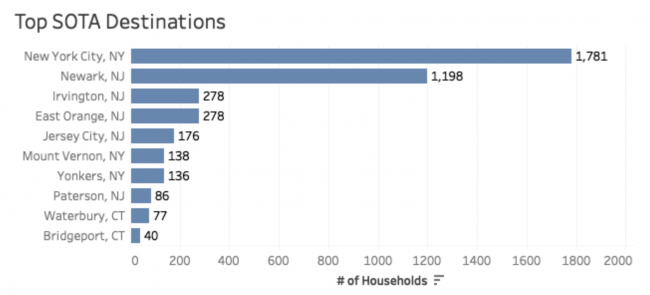Trending
Here’s why Jersey City is joining Newark in suing de Blasio
Investigation found homeless relocated to NJ "living in squalor"
Jersey City has filed a motion to intervene in a lawsuit over New York City’s controversial homeless relocation program, as Mayor Steven Fulop indicated it would last week.
The lawsuit was filed by the city of Newark earlier this month, and sought to block New York from relocating more families to the city through its Special One Time Assistance program, or SOTA. The suit also sought to require the city to provide information on individuals and families that had been relocated to Newark through the program.
In their motion, Jersey City’s attorneys note that their municipality is in “the same or substantially similar position” as Newark. They claim that their concern is for the relocated homeless persons.
“It is a municipality outside of New York City that has received residents under the SOTA program and because of the program’s shortcomings, Jersey City now has residents that were previously homeless, that are living in housing that was not properly inspected, with no information to contact these individuals to offer the city’s social services or inform them of their housing rights in this state,” the document filed Thursday states.
Between the SOTA program’s launch in September 2017 and August 2019, it relocated 176 households to Jersey City and 1,198 to Newark. Another 1,781 households were relocated within New York City itself.
SOTA is a voluntary program that provides one year of rental assistance to working families or individuals who have been living in a shelter for at least 90 days. It enables recipients to relocate anywhere in the country.
While the majority of SOTA recipients have stayed in New York and neighboring states, one household relocated all the way to Hawaii. Florida, Georgia and North Carolina have also received dozens of families, according to data from the city’s Department of Homeless Services.
An investigation by the city’s Department of Investigation found that the SOTA program’s “lack of proper oversight and poorly designed paperwork” led to some families “living in squalor under the roofs of unscrupulous landlords, who collected tens of thousands of dollars in rental payments upfront from the city to provide these subpar conditions with little risk of accountability for their actions.”
New York City says that it has worked to address these shortcomings. It has countersued, arguing that Newark’s efforts to block SOTA recipients are “irrational and discriminatory.”
An ordinance passed by Newark last month makes it illegal to “knowingly bring, or cause to be brought, a needy person to the City of Newark for the purpose of making him or her a public charge.” New York City has the opposite obligation: It is required by a consent decree to provide shelter to people in the five boroughs who cannot otherwise get it — a mandate that draws some homeless people from New Jersey and elsewhere.
The de Blasio administration’s attorneys have rejected blame for the squalid conditions in which some SOTA families were housed. “Newark seeks to hold NYC liable for conditions that might exist inside private apartments in Newark even though it is the owners, not NYC, who are responsible for maintaining those apartments,” they said in a response to the case, citing prior litigation that found lead-paint manufacturers were not liable for lead poisoning.
Other New Jersey towns, including Orange, East Orange and Irvington, are also planning to take action in response to SOTA, CBS2 reported last month.
Write to Kevin Sun at ks@therealdeal.com





